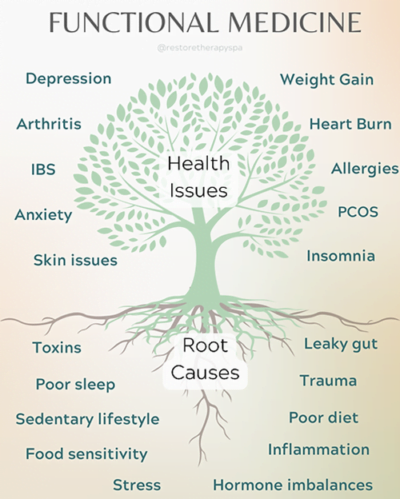If you are one of the many people who live with chronic illnesses, then you understand the challenge of managing and preventing the symptoms that accompany these conditions. From autoimmune diseases, chronic pain, to digestive issues, the traditional path of Western medicine may not have the answers you need. That’s where functional medicine comes in. This approach focuses on identifying the root causes of your health problems and creating a personalized treatment plan to help you heal and prevent future diseases.
Let’s explore the functional medicine approach and why it may be the key to optimizing your health.

- Functional medicine is a holistic approach to healthcare that addresses the natural causes of disease rather than simply treating the symptoms. This means looking at the whole person’s lifestyle, genetics, and environment to identify the underlying imbalances causing their health issues.
By understanding each person is unique, they need to be treated with individualized care rather than the one-size-fits-all approach of traditional medicine.

2. Functional Medicine Practitioners: Functional medicine practitioners come from various backgrounds in the medical field, including massage therapists, health and wellness coaches, doctors, nurses, nutritionists, and naturopaths. They undergo specialized training in functional medicine, understanding the complex interactions between genetics, lifestyle, and environmental factors in health and disease.
These practitioners emphasize a patient-centered approach, spending time with their patients, listening to their histories, and looking beyond the symptoms to uncover the root cause of illness. This holistic understanding allows them to develop personalized treatment plans to address an individual’s unique needs and circumstances.
3. Utilizing a Certified Functional Practitioner: A certified FM practitioner has undergone rigorous training and passed examinations to prove their proficiency.
They apply the latest research and proven methods to formulate personalized treatment plans. Together you will co-creating a plan to address immediate symptoms and strategize preventive measures to enhance your long-term health and wellness. This understanding and personalized approach sets certified FM practitioners apart, making them a key asset in managing and preventing chronic illnesses.
4. The Role of Testing: One of the hallmarks of functional medicine is comprehensive laboratory testing to identify imbalances and deficiencies in the body. This testing can reveal the root causes of chronic illnesses, such as inflammation, hormone imbalances, and gut dysbiosis. Once these imbalances are identified, practitioners can create a personalized treatment plan that addresses each patient’s needs.

5. The Importance of Nutrition: Functional medicine strongly emphasizes nutrition’s role in promoting health and preventing disease. This approach understands that food is medicine, and the proper diet can support the body’s natural healing processes.
Functional medicine practitioners work with their patients to develop individualized nutrition plans considering their health needs and food preferences.
6. Other Therapies and Modalities: In addition to nutrition, functional medicine practitioners may use various therapies and modalities to support their patients’ health. These may include supplements, herbal remedies, acupuncture, massage, and stress-reducing techniques such as meditation. Functional medicine aims to create a personalized treatment plan that addresses each patient’s unique needs and promotes optimal health and wellness.

7. Benefits of Functional Medicine: There are many benefits to the functional medicine approach. By identifying and treating the root causes of chronic illnesses, patients often experience improved health and reduced symptoms. This approach also emphasizes patient empowerment, as patients are encouraged to actively participate in their health and wellness. In addition, functional medicine can be more cost-effective in the long run, focusing on preventing disease before it develops rather than treating symptoms as they arise.
8. Functional Medicine Terminology: To better understand the field of functional medicine, it’s essential to familiarize yourself with some common terminology. Here are a few key terms:
-
- Patient-centered care is a healthcare approach that profoundly considers the patient’s experiences, values, and needs in treatment. It is a core principle of functional medicine.
- Integrative Medicine: This term often goes hand-in-hand with functional medicine. It refers to combining conventional (Western) medicine and alternative therapies to treat the whole person, not just the symptoms.
- Holistic Healing: This is a comprehensive form of healing that considers the whole person – body, mind, and spirit – in the quest for optimal health and wellness. It’s a foundation upon which functional medicine is built.
- Functional Laboratory Testing: This refers to the in-depth testing often used in functional medicine to identify the root causes of health issues. It may include testing for nutritional deficiencies, hormone imbalances, genetic mutations, etc.
- Preventative Medicine: This term refers to strategies to prevent diseases before they occur. This is a critical focus in functional medicine, as the goal is to maintain health and wellness rather than simply treating existing diseases.
- Positive Psychology: This branch of psychology focuses on enhancing well-being and happiness. It takes a strengths-based approach, emphasizing personal growth, self-improvement, and pursuing fulfilling life experiences. Positive psychology is closely aligned with the principles of functional medicine, as it places a significant emphasis on preventative strategies, holistic care, and the role of positive lifestyle changes in promoting health and wellness.
9. Highly respected functional medicine training programs to enhance their understanding and skill set.
-
- The Institute for Functional Medicine: This institute offers a comprehensive program encompassing a range of courses, including the Applying Functional Medicine in Clinical Practice (AFMCP) course.
- The Functional Medicine Coaching Academy: This academy is specifically aimed at those interested in becoming health coaches within the functional medicine field. The program focuses on integrating the principles of functional medicine, positive psychology, and professional coaching. Participants learn to support clients in making sustainable changes and managing chronic conditions. This training complements the work of functional medicine practitioners and is recognized by the Institute for Functional Medicine.
These training programs provide a solid foundation in the principles of functional medicine but also keep practitioners abreast of the latest research and developments in the field. This continuous learning is crucial in the ever-evolving field of medicine, ensuring practitioners can provide their patients the best possible care.

Functional medicine offers a unique approach to healing, maintaining, and preventing chronic illnesses that is personalized, holistic, and effective. By focusing on the root causes of disease and promoting optimal health through nutrition, lifestyle changes, and other therapies, this approach can help patients achieve long-lasting health and wellness. If you are struggling with a chronic illness or simply looking to optimize your health, consider exploring the functional medicine approach and finding a practitioner who can help you achieve your health goals.
